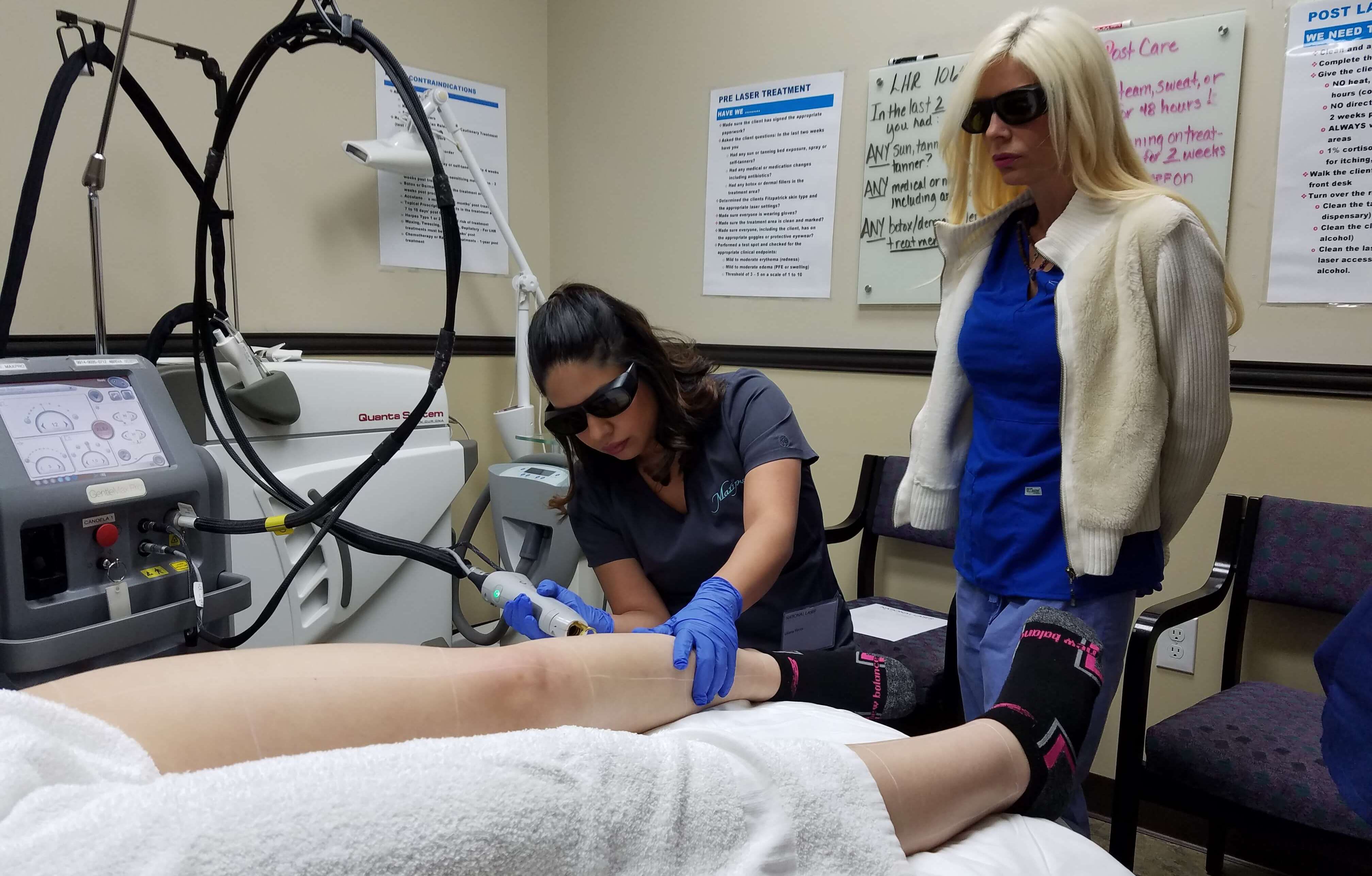Home>How-to Guides>For Women>How To Get Certified To Do Laser Hair Removal


For Women
How To Get Certified To Do Laser Hair Removal
Modified: August 2, 2023
Learn how to get certified to do laser hair removal for women. Start a rewarding career in the beauty industry with our comprehensive training program.
(Many of the links in this article redirect to a specific reviewed product. Your purchase of these products through affiliate links helps to generate commission for Under-tec.com, at no extra cost. Learn more)
Table of Contents
- Introduction
- Why Certification is Important
- Understanding the Basics of Laser Hair Removal
- Finding a Reputable Training Program
- Meeting the Eligibility Requirements
- Choosing the Right Certification Board
- Enrolling in a Laser Hair Removal Course
- Completing the Required Practical Training
- Passing the Certification Exam
- Obtaining Your Certification
- Maintaining Your Certification
- Conclusion
Introduction
Laser hair removal is a popular cosmetic procedure that offers a long-term solution for unwanted hair. As the demand for this treatment continues to grow, it has become increasingly important for professionals to receive proper certification in order to provide safe and effective services to their clients. Obtaining certification not only ensures that you have the necessary knowledge and skills to perform laser hair removal, but it also adds credibility to your practice and builds trust with potential clients.
In this article, we will explore the process of getting certified to perform laser hair removal and why it is crucial for anyone considering a career in this field. We will discuss the basics of laser hair removal, finding a reputable training program, meeting the eligibility requirements, choosing the right certification board, enrolling in a laser hair removal course, completing the required practical training, passing the certification exam, obtaining your certification, and maintaining your certification.
Whether you are a skincare professional looking to expand your services or someone who is passionate about helping others feel confident in their own skin, getting certified in laser hair removal is a crucial step towards a rewarding career. By following the guidelines outlined in this article, you will be well on your way to becoming a certified laser hair removal technician and providing top-notch services to your clients.
Why Certification is Important
Certification is essential for anyone wanting to perform laser hair removal procedures due to the precision and potential risks involved. Here are several reasons why certification is important:
- Knowledge and Skills: Laser hair removal involves using advanced technology and requires a deep understanding of the skin and hair. Certification ensures that you have received comprehensive training to perform the procedure safely and effectively.
- Safety: Laser hair removal can cause potential harm if not performed correctly. Certification ensures that you are well-versed in safety protocols, such as using appropriate equipment settings, protecting the client’s eyes, and identifying contraindications and potential side effects.
- Ethics and Professionalism: Certification demonstrates your commitment to ethical practice and adhering to professional standards. It shows that you have been trained to prioritize client safety, informed consent, and privacy.
- Client Confidence: Being certified instills confidence in potential clients, as they know they are seeking treatment from a qualified professional. Certification enhances your credibility, making clients more likely to choose your services over uncertified practitioners.
- Legal Requirements: In many jurisdictions, proper certification is mandatory to legally offer laser hair removal services. By acquiring certification, you ensure that you are operating within the legal framework and avoid potential legal issues or penalties.
- Continued Education: Certification often requires ongoing education and training to maintain your knowledge and keep up with industry advancements. This ensures that you stay updated with the latest techniques and safety practices in laser hair removal.
In summary, certification is vital for those seeking to perform laser hair removal as it provides a solid foundation of knowledge, ensures safety, upholds ethical standards, boosts client confidence, meets legal requirements, and encourages continued education. By obtaining certification, you differentiate yourself as a qualified professional in this competitive field and establish a reputation for delivering exceptional and safe laser hair removal services.
Understanding the Basics of Laser Hair Removal
Laser hair removal is a non-invasive cosmetic procedure that uses laser technology to target and remove unwanted hair. Before pursuing certification, it is crucial to have a solid understanding of the basic principles and process of laser hair removal. Here are the key aspects to consider:
- How it works: Laser hair removal works by emitting a concentrated beam of light that is absorbed by the pigment in hair follicles. The light energy converts to heat, damaging the follicles and inhibiting future hair growth.
- Skin and hair types: The effectiveness and safety of laser hair removal can vary depending on the client’s skin and hair type. Generally, the procedure is most effective on individuals with light skin and dark, coarse hair, as the contrast allows for better targeting of the hair follicles.
- Preparation and precautions: Prior to the treatment, clients must avoid sun exposure and certain medications that can increase sensitivity. It is important to conduct a thorough consultation to assess any potential contraindications or allergies to ensure the safety of the procedure.
- Treatment process: During the procedure, a handheld device is used to deliver quick pulses of laser energy to the treatment area. The client may experience a slight prickling or warm sensation, which can be mitigated with cooling techniques. Multiple sessions are typically necessary to achieve long-term hair reduction.
- Potential risks and side effects: While laser hair removal is generally safe, there are potential risks and side effects to be aware of. These may include temporary skin irritation, redness, swelling, and pigmentation changes. Proper training and a thorough understanding of these risks are essential to minimize potential complications.
- Post-treatment care: After each session, clients should follow specific post-treatment instructions, which may include avoiding sun exposure, using moisturizers, and refraining from certain activities that could irritate or damage the treated area.
Understanding the fundamentals of laser hair removal is essential for a successful and safe practice. As a certified technician, it is vital to educate yourself about different skin and hair types, preparation and precautions, the treatment process, potential risks and side effects, and post-treatment care. By mastering these basics, you will be well-equipped to handle various client needs and ensure optimal outcomes in laser hair removal procedures.
Finding a Reputable Training Program
Choosing the right training program is a crucial step in obtaining certification for laser hair removal. It is essential to find a reputable program that provides comprehensive education and hands-on training. Here are some key factors to consider when searching for a training program:
- Accreditation and Certification: Ensure that the training program is accredited by a recognized accreditation body and that the certification they offer is widely recognized in the industry.
- Curriculum: Review the curriculum of the training program to ensure that it covers all the essential theoretical knowledge and practical skills required for laser hair removal.
- Experienced Instructors: Look for a program that is taught by experienced instructors who have expertise in laser hair removal and can provide hands-on guidance and mentorship.
- Facility and Equipment: Check if the training program has a well-equipped facility with up-to-date laser devices. Having access to the latest technology will enhance your learning experience and prepare you for real-world scenarios.
- Reviews and Recommendations: Research reviews and seek recommendations from professionals who have completed the training program. Their insights can provide valuable information about the program’s quality and effectiveness.
- Hands-on Training Opportunities: Ensure that the program offers ample hands-on training opportunities, allowing you to practice the skills learned in a supervised and controlled environment.
- Support and Resources: Find out what kind of support and resources the training program provides, such as access to study materials, ongoing mentorship, and post-training assistance.
- Tuition and Schedule: Consider the cost of the program and whether it fits within your budget. Additionally, assess the program’s schedule and duration to ensure it aligns with your availability and commitments.
By thoroughly researching and evaluating potential training programs, you can find the one that best meets your needs and sets you up for success in obtaining your certification for laser hair removal. Remember, investing in a reputable training program is an investment in your career and the quality of services you will provide to your clients.
Meeting the Eligibility Requirements
Before enrolling in a laser hair removal training program, it is important to ensure that you meet the eligibility requirements set by the certification board or governing body. These requirements may vary based on your location and the specific certification you are pursuing. Here are some common eligibility criteria to consider:
- Education: Most certification programs require a high school diploma or equivalent level of education. Some may have additional prerequisites, such as a background in skincare or a related field.
- Licensing: Check if your jurisdiction requires a professional license to perform laser hair removal. If so, ensure that you have obtained the necessary license before pursuing certification.
- Age: Verify the minimum age requirement for the certification program. Some programs may have a minimum age limit to ensure that candidates are mature enough to handle the responsibilities of the profession.
- Medical Conditions: Certain medical conditions or medications can affect a person’s eligibility to undergo or perform laser procedures. Make sure to disclose any relevant medical information to the certification board and training program.
- Background Check: Some certification boards may require a clean background check to ensure the safety and integrity of the profession. It is important to be aware of any background check requirements and comply with them.
- Professional Experience: While not always a prerequisite, having prior experience in a related field, such as esthetics or healthcare, can be advantageous when pursuing certification for laser hair removal.
It is essential to carefully review the eligibility requirements of the certification board or governing body before enrolling in a training program. This will save you time and effort by ensuring that you meet the necessary qualifications. If you do not meet the requirements initially, you may need to acquire the necessary education or experience before pursuing certification.
By meeting the eligibility requirements, you demonstrate your commitment to the profession and increase your chances of a successful certification process. It also ensures that you are ready to embark on a career in laser hair removal with the necessary qualifications and competencies.
Choosing the Right Certification Board
When pursuing certification for laser hair removal, it is important to choose the right certification board or governing body to ensure that your certification is recognized and respected in the industry. Here are some factors to consider when selecting a certification board:
- Accreditation: Look for certification boards that are accredited by reputable organizations in the field of aesthetics or laser technology. Accreditation ensures that the board meets rigorous standards and follows best practices in certification.
- Industry Recognition: Research the reputation and recognition of the certification board within the industry. A certification from a well-known and respected board can enhance your professional credibility and validity as a laser hair removal technician.
- Certification Requirements: Review the specific requirements set by the certification board. Ensure that you meet these requirements and that they align with your career goals and aspirations. Consider factors such as education, training, and practical experience.
- Maintenance and Renewal: Find out about the maintenance and renewal requirements of the certification. Some boards may require ongoing education or periodic renewal exams to ensure that certified professionals stay up-to-date with the latest advancements in the field.
- Support and Resources: Assess the resources and support provided by the certification board. Look for boards that offer continuing education opportunities, access to industry publications, networking events, and other resources that can help you stay connected and informed.
- Membership Benefits: Consider any additional benefits of becoming a member of the certification board. These may include discounts on conferences or events, access to job boards or career resources, and opportunities for professional growth and advancement within the field.
- Cost: Evaluate the cost associated with certification and membership fees. While cost should not be the sole determining factor, it is important to choose a board that offers a fair and reasonable fee structure for the services and benefits provided.
Take the time to research and evaluate different certification boards before making a decision. Consult with industry professionals, attend networking events, and seek recommendations to gather insights and make an informed choice. Remember, the certification board you choose will play a significant role in your professional journey and the recognition of your skills and competency as a laser hair removal technician.
Enrolling in a Laser Hair Removal Course
Once you have identified the right certification board and reviewed their requirements, the next step is to enroll in a laser hair removal course that meets the approved standards of the certification board. Here are some important considerations when enrolling in a course:
- Course Content: Ensure that the course covers all the necessary theoretical knowledge and practical skills required for laser hair removal. It should include topics such as skin anatomy, hair growth cycles, laser physics, different laser technologies, safety protocols, and client consultation.
- Credibility of the Training Provider: Research the reputation and credibility of the training provider offering the course. Check for testimonials, reviews, and the qualifications and experience of the instructors.
- Delivery Method: Consider whether the course is offered in-person, online, or a combination of both. Evaluate which delivery method aligns with your learning style and availability.
- Course Duration: Review the course duration and schedule to ensure that it fits within your time constraints and commitments. Consider whether the course is part-time or full-time and if it offers flexibility in scheduling.
- Practical Training: Check if the course includes hands-on practical training. Practical experience is crucial for gaining the necessary skills and confidence in performing laser hair removal procedures.
- Course Certification: Inquire about the certification or qualification that you will receive upon completing the course. Ensure that it is recognized by the certification board you are aiming to be certified by.
- Cost and Financial Aid: Evaluate the cost of the course and if there are any financial aid options available, such as scholarships or installment plans. Consider the value you will gain from the course compared to the investment.
- Support and Resources: Find out what kind of support the training provider offers during and after the course. This may include access to trainers, study materials, online resources, and a community of fellow students and professionals.
Choosing the right laser hair removal course is vital for acquiring the knowledge and skills necessary for certification. By thoroughly evaluating course content, credibility, delivery method, practical training, certification, cost, and support, you can make an informed decision and embark on a course that will equip you for a successful career in laser hair removal.
Completing the Required Practical Training
Practical training is an essential part of the certification process for laser hair removal. It allows you to apply the theoretical knowledge you gained during your coursework and develop the necessary skills for conducting safe and effective treatments. Here are some key aspects to consider when completing the required practical training:
- Hands-on Experience: Practical training provides you with valuable hands-on experience under the guidance of experienced professionals. This allows you to refine your technique, learn how to operate laser devices, and gain confidence in performing laser hair removal procedures.
- Supervised Practice: Ensure that your practical training is conducted under the supervision of a qualified instructor or preceptor. This ensures that you receive appropriate guidance, feedback, and support during your training process.
- Variety of Clients and Treatments: Seek practical training opportunities that expose you to a diverse range of clients with different hair and skin types. This will allow you to develop the versatility and adaptability needed to customize treatments to each individual’s specific needs.
- Observation and Assistance: Take advantage of opportunities to observe experienced practitioners in action. This will provide you with insights into different techniques, client interactions, and treatment strategies that can enhance your own skills.
- Adherence to Safety Protocols: During practical training, it is crucial to prioritize the safety and well-being of clients. Ensure that you are trained in proper safety protocols, including eye protection, skin cooling techniques, and managing adverse reactions or complications.
- Record-Keeping and Documentation: Learn the importance of accurately documenting client information, treatment details, and any adverse reactions. Proper record-keeping ensures continuity of care, accurate assessment of treatment outcomes, and adherence to legal and ethical standards.
- Receiving Constructive Feedback: Embrace feedback from your instructors or preceptors as an opportunity for growth. Actively seek feedback to identify areas for improvement and continuously sharpen your skills throughout the practical training period.
- Time and Dedication: Practical training requires time and dedication to complete the required number of supervised procedures. Be prepared to invest the necessary time and effort to gain the practical experience needed for certification.
Completing the required practical training is an invaluable step in the certification process for laser hair removal. By actively participating, seeking feedback, adhering to safety protocols, and gaining diverse experiences, you will develop the confidence and skills needed to provide effective and safe treatments to your future clients.
Passing the Certification Exam
The certification exam is the final hurdle in obtaining your certification for laser hair removal. It is designed to assess your knowledge, understanding, and ability to apply the principles and practices of laser hair removal. Here are some key factors to consider when preparing for and taking the certification exam:
- Review Exam Content: Familiarize yourself with the exam content and the topics that will be covered. This will help you focus your studying efforts and ensure that you are well-prepared in all relevant areas.
- Study Materials: Utilize study materials provided by the certification board or recommended by your training program. This may include textbooks, online resources, practice quizzes, and sample exam questions.
- Practice Exams: Take advantage of any practice exams available to help you simulate the exam environment and evaluate your readiness. Analyze your performance, identify areas of weakness, and adjust your study plan accordingly.
- Time Management: Develop a study schedule that allows you to cover all the necessary materials while also leaving ample time for review and practice. Practice managing your time effectively during study sessions to ensure you can complete the exam within the allocated timeframe.
- Focus on Key Concepts: Identify the key concepts, principles, and procedures that are commonly tested in the certification exam. Understand the underlying theories and be able to apply them in different scenarios.
- Stay Updated: Keep up with industry advancements and changes in laser hair removal practices. Stay informed about the latest research, techniques, and safety guidelines to ensure that your knowledge is current.
- Stay Calm and Confident: On the day of the exam, stay calm and confident in your abilities. Avoid last-minute cramming, get a good night’s sleep, and arrive at the exam venue with sufficient time to relax and mentally prepare.
- Read and Follow Instructions: Carefully read and understand all instructions provided for the exam. Pay attention to the question format, marking scheme, and any specific requirements for providing answers.
Passing the certification exam requires thorough preparation, effective time management, and a solid understanding of the principles and practices of laser hair removal. By studying diligently, using appropriate resources, practicing with sample questions, and staying calm during the exam, you can increase your chances of success and obtain your certification as a laser hair removal technician.
Obtaining Your Certification
After completing the required training and passing the certification exam, the next step is to obtain your official certification as a laser hair removal technician. Here is an overview of the process:
- Application: Submit an application to the certification board or governing body, providing all the required documentation and fees. Ensure that you include your training completion certificate and exam results as part of your application.
- Review and Approval: The certification board will review your application, verify your credentials, and assess your eligibility for certification. This process may take some time, so be patient and follow up if necessary.
- Certification Document: Once your application is approved, you will receive a certification document from the board. This document serves as official proof that you have met the requirements and have been deemed competent to perform laser hair removal.
- License, if Applicable: In some jurisdictions, you may also need to obtain a professional license to legally offer laser hair removal services. Ensure that you complete any additional steps required by your local regulatory authorities.
- Celebrate and Display: Display your certification proudly in your workplace. It not only showcases your achievement but also builds trust and confidence with your clients. Celebrate your accomplishment and the hard work you put into obtaining your certification.
- Continuing Education: Maintain your certification by engaging in continuing education. Stay updated with the latest advancements in laser hair removal techniques, safety protocols, and industry best practices. This will ensure that you provide the highest quality of care to your clients.
- Certification Renewal: Be aware of the certification renewal process and any continuing education requirements. Stay organized and submit the necessary documentation and fees to renew your certification on time.
- Professional Development: Engage in ongoing professional development to further enhance your skills and expand your knowledge in the field. Attend conferences, workshops, and seminars to stay connected with industry trends and network with other professionals.
Obtaining your certification is a significant achievement and a testament to your dedication and expertise in the field of laser hair removal. By following the required application process, maintaining your certification through continuing education, and investing in your professional development, you will continue to thrive as a skilled and respected laser hair removal technician.
Maintaining Your Certification
Maintaining your certification as a laser hair removal technician is crucial for staying current in the field and upholding professional standards. Here are some key steps to ensure that you continue to meet the requirements and maintain your certification:
- Continuing Education: Engage in regular continuing education to stay updated with the latest advancements in laser hair removal techniques, equipment, and safety protocols. Attend workshops, conferences, and webinars to enhance your knowledge and skills.
- Renewal Process: Familiarize yourself with the certification board’s renewal process and timeline. Keep track of when your certification is due for renewal and submit the required documentation, fees, and any necessary continuing education credits in a timely manner.
- Stay Informed: Stay informed about any changes in regulations or guidelines related to laser hair removal. This includes understanding any updated safety protocols, contraindications, or best practices that may affect your practice.
- Networking and Collaboration: Connect with other professionals in the field through networking events, industry forums, and online communities. Collaborate and share knowledge to stay engaged and informed about emerging trends and practices.
- Quality Assurance: Maintain the highest level of quality assurance in your practice. Implement and adhere to strict infection control protocols, keep accurate client records, and continuously seek feedback from clients to ensure optimal outcomes.
- Ethical Practice: Maintain a commitment to ethical practice by respecting client confidentiality, obtaining informed consent, and providing honest and transparent information about procedures, risks, and expected outcomes.
- Professional Growth: Seek opportunities for professional growth and advancement in the field. This could include pursuing advanced certifications, expanding your skill set with additional training, or taking on leadership roles within professional organizations.
- Maintain Professional Liability Insurance: Protect yourself and your practice by maintaining professional liability insurance. This ensures that you are covered in the event of any unforeseen complications or legal issues related to your work.
By actively participating in continuing education, staying informed, networking, and maintaining high professional standards, you can ensure that you stay at the forefront of the laser hair removal field and continuously provide exceptional care to your clients. Maintaining your certification demonstrates your commitment to ongoing professional development and reinforces your credibility as a skilled and reputable laser hair removal technician.
Conclusion
Obtaining certification as a laser hair removal technician is a pivotal step towards a successful and fulfilling career in the field. It demonstrates your commitment to professionalism, safety, and excellence in providing laser hair removal services. Certification not only builds trust with potential clients but also expands your opportunities for career growth and advancement.
In this article, we have explored the importance of certification and the steps involved in becoming a certified laser hair removal technician. We discussed understanding the basics of laser hair removal, finding a reputable training program, meeting eligibility requirements, choosing the right certification board, enrolling in a laser hair removal course, completing the required practical training, passing the certification exam, and finally obtaining and maintaining your certification.
By following the recommended guidelines, conducting thorough research, and investing in comprehensive training, you can acquire the necessary knowledge and skills to provide safe and effective laser hair removal treatments. As a certified professional, you will instill confidence in your clients and ensure that you deliver outstanding results.
Remember, certification is not a one-time achievement, but an ongoing commitment to professional development and adherence to ethical and safety standards. Stay updated with industry advancements, continuously enhance your skills through continuing education, and maintain the highest level of professionalism in your practice.
Embark on this rewarding journey, and let your passion for helping others feel confident in their own skin shine as a certified laser hair removal technician.






